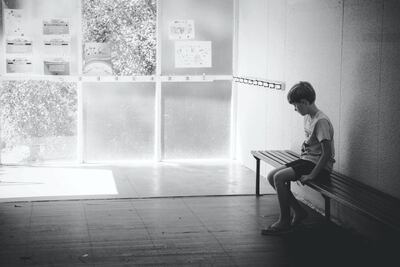Governments need to address children's needs sufficiently when easing lockdowns to avoid widespread youth loneliness caused by the coronavirus pandemic, leading social psychologists have told The National.
Dr Maria Loades, a clinical psychologist and senior lecturer in Psychology at the University of Bath in the UK, defines "loneliness" as a "discrepancy between our actual social contacts and what we desire them to be". Loneliness is not necessarily the same as social isolation – it is possible to feel lonely even if you are surrounded by people.
In Dr Loades’ review last week, she found children who had experienced social distancing measures were five times more likely to require mental health services.
The review found that the absence of physical activity, social interaction and support, and a lack of structure, routine and purposeful activities caused by social distancing measures had an adverse impact on children’s mental health.
Speaking to The National, Dr Loades said that feelings of chronic loneliness from the pandemic during childhood could continue, even long after restrictions are loosened.
“For many young people, loneliness will reduce as they are able to re-establish social contacts and connections as lockdown eases – for example, as they return to school or college. For some, though, and particularly for those who were more vulnerable to being socially isolated before lockdown ensued, and to those who may not be able to resume social activities due to shielding, for example, loneliness may be prolonged by their struggle to resume social life.”

Julianne Holt-Lunstad, professor of psychology and neuroscience at Brigham Young University in Utah, also specialises in loneliness and social connection.
“What we don't know yet is whether social distancing measures have been elevated to the point they are traumatic (or for whether it may be for some children in some circumstances). That can depend largely on how one copes,” she said.
Young people can avoid loneliness during lockdown by taking up new hobbies and building social skills, even if through electronic means. Physical activity, getting good rest and doing things they enjoy is also central to their well-being.
Dr Loades said plans for children must be a central pillar of government’s lockdown-easing strategies.
“It’s central that children and young people are allowed to return to activities such as playing together, even if outdoors, as soon as possible, and that they are able to resume attending school, which gives them a structure for their day and provides them with opportunities to see peers and to get support from adults outside of the nuclear family,” she said.
“There have been several open letters including #playfirst, led by Professor Ellen Townsend, and also a letter from paediatricians in the UK calling on the government to consider children’s needs more in their strategy for easing lockdown. Alongside this, the government could target children’s well-being in public health messaging.”
Specialist mental-health services were already struggling in the UK before the pandemic, Dr Loades said, but there were two main actions the government could take to address it.
“The first of these is to take a universal approach to promoting well-being – by public messaging, and by schools doing activities to promote well-being in children and young people as they resume.
“The second of these is to seek to identify those who are struggling as early as possible, and to do targeted interventions to help them to overcome their struggle as soon as possible. This may be by providing them with extra support in schools, like helping them to overcome anxieties about returning to school, or giving them an extra hand with reconnecting socially with peers.
Dr Loades also called on the government to highlight resources such as ThinkNinja, a self-help programme and app based on Cognitive Behaviour Therapy (CBT) principles that is available free in the UK during lockdown.
In the United States, where Dr Holt-Lunstad works, mental health services are also in need of more investment.
“Mental health services are underfunded relative to medical health services. More resources are needed to adequately meet the needs of the population,” she said.











